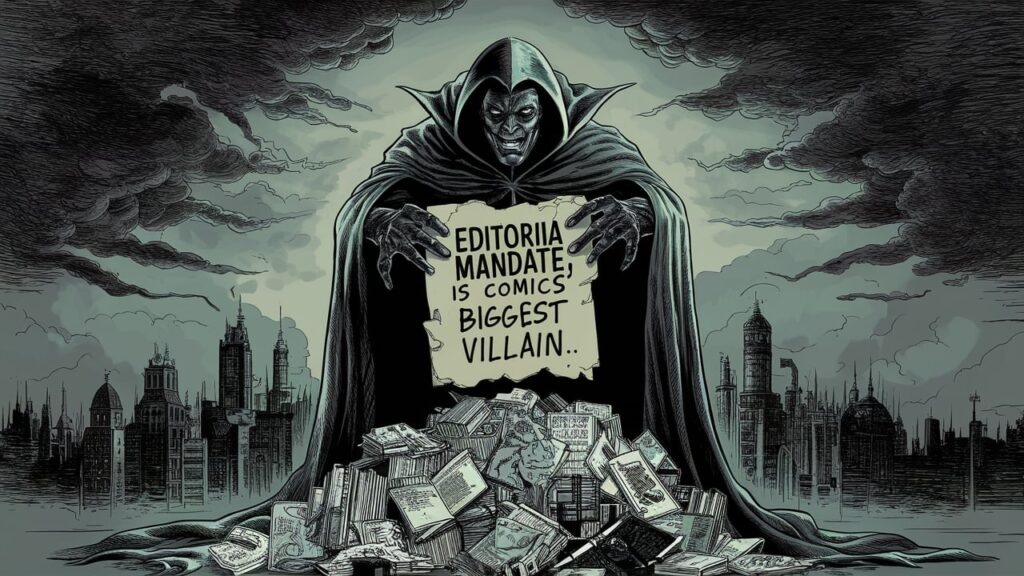Table of contents
The adventures and misadventures of the greatest superheroes. Super villains in history have been told to generations of fans by Marvel and DC Comics for nearly a century. Collaboration is exemplified by the creation of superhero comics. Not only do writers collaborate with illustrators, but they also work with colourists. They achieve the proper tone for the artwork. Letterers make the captions come to life, and editors, whose role it is to supposedly enable everyone to collaborate and produce the greatest stories. Several of the most significant figures in the history of superhero comics have served as editors. Including Joe Quesada, Axel Alonso, Tom Brevoort, Len Wein, Stan Lee, and Julius Schwartz.
The phrase “editorial mandate” is one of the most dreaded terms in comics. It has become increasingly laden over time. One of the most despised elements of comics is the editorial mandate. The worst parts of superhero stories are frequently caused by them. But you don’t notice them when everything is going well. The editors at DC and Marvel have frequently been the biggest bad guys in the medium. They take beloved characters and situations and change them, usually to the detriment of the fandom.
Comics have suffered greatly in the twenty-first century due to editorial mandates.
Now, not all editorial demands are wicked. At its most detached, the editor’s role is to ensure that the authors and illustrators are providing readers with the most cohesive narratives possible. Ones that correspond to the years of character growth. The issue arises, though, when the editor’s perception of a character differs from that of the broader public. The worst illustration of this is the catastrophe that the Spider-Man comics have devolved into. This is a result of the most contentious tale of the twenty-first century, “One More Day.”
I’ll do my best to simplify this as soon as I can, but it’s really intricate. Although Spider-Man was one of Marvel’s best-selling characters for a long time. The Clone Saga in the 1990s severely damaged the company’s reputation. The Amazing Spider-Man was written by J. Michael Straczynski, the man behind the TV shoe Babylon 5.
Spider Man Story
He told captivating Spider-Man stories and was better than almost anyone at presenting Spider-Man’s relationship with his wife, Mary Jane. But The Amazing Spider-Man didn’t achieve the same level of success as it achieved before to the Clone Saga. Quesada and Marvel executive editor Tom Brevoort believed that Spider-Man was more popular when they were young. This was before the character was married. They wanted to end the marriage rather than blaming it on the harm the Clone Saga caused to the fandom. They created “One More Day” in an attempt to address their perception that Spider-Man was becoming too mature. The choice to remove the marriage from continuity has plagued the Spider-Man series ever since.
Here is where editorial mandate issues come into play. Due to Quesada and Brevoort’s concept of Spider-Man, they eliminated an element that most fans enjoyed. When discussing fans who genuinely enjoy an unmarried Spider-Man, Marvel frequently ignores or makes fun of those who don’t. Employing corporations give these characters to editors, who have the last word on everything.They will provide recommendations to the authors about the kinds of stories they would like to see the next time they hire them.
X-Men
An excellent illustration of this is the current X-Men “From the Ashes” phase. After the Krakoa Era, Brevoort was appointed editor of the X-Men books. His entire concept for the line is a step backward. Writers submit concepts that align with his desire for the X-Men to be what they were in the 1980s and 1990s. Do all of the fans want this? No, and that’s where the issues come from. The editors make the final decisions, and we are forced to purchase the books that are produced. Are yououu against Marvel incorporating elements from the MCU into the comics? Unfortately, there is an editorial mandate.
The 2010s’ canceled Inhumans campaign was ordered by the editor. Not a fan of Batman appearing in every DC novel? Batman, however, sells. Thus, editors ensure that he appears in more books. Readers are forced to do things they don’t desire by editorial mandates. This is advantageous at times. Many creatives have expressed over the years that they don’t write for their audience because if they did, they would be telling the stories. Writer Alan Moore has echoed this sentiment. Editorial mandates have proven beneficial in many instances, but as I mentioned above, nobody ever pays attention to them.

